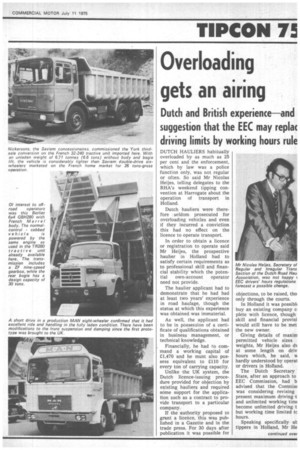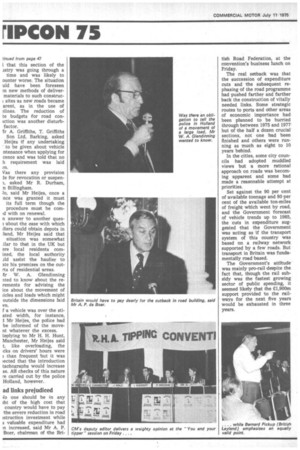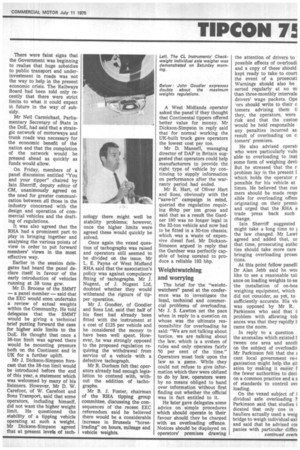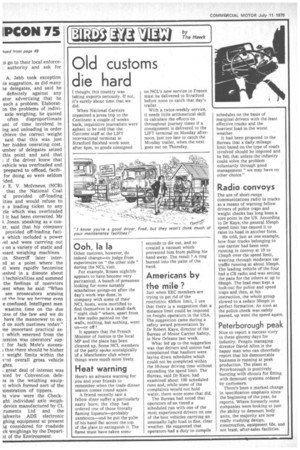Overloading gets an airing
Page 49

Page 50

Page 51

Page 52

If you've noticed an error in this article please click here to report it so we can fix it.
Dutch and British experience—and
suggestion that the EEC may replac
driving limits by working hours rule
DUTCH HAULIERS habitually overloaded by as much as 25 per cent and the enforcement, which by law was a police function only, was not regular or often. So said Mr Nicolas Heijes, telling delegates to the RHA's weekend tipping convention at Harrogate about the operation of transport in Holland.
Dutch hauliers were therefore seldom prosecuted for overloading vehicles and even if they incurred a conviction this had no effect on the licence to operate transport.
In order to obtain a licence or registration to operate said Mr Heijes, the prospective haulier in Holland had to satisfy certain requirements as to professional skill and financial stability which the potential own-account operator need not provide.
The haulier applicant had to demonstrate that he had had at least two years' experience in road haulage, though the status at which this experience was obtained was immaterial.
As well, the applicant had to be in possession of a certificate of qualifications obtained in business management, or technical knowledge.
Financially, he had to command a working capital of £1,470 and he must also possess equivalent to £110 for every ton of carrying capacity.
Unlike the UK system, the Dutch licence-issuing procedure provided for objection by existing hauliers and required some support for the application such as a contract to provide transport to a particular company.
If the authority proposed to grant a licence, this was published in a Gazette and in the trade press. For 30 days after publication it was possible for objections, to he raised, tho only through the courts.
In Holland it was possibli buy an existing company o plete with licence, though skill and financial provisi would still have to be met the new owner.
Giving details of maxim permitted vehicle sizes weights, Mr Heijes also cl% at some length on driv hours which, he said, IA hardly understood by operat or drivers in Holland.
The Dutch Secretary State, .after an approach to EEC Commission, had b advised that the Conimiss. was considering revising present maximum driving t and unlimited working tim( become unlimited driving t but working time limited tc hours.
Speaking specifically tippers in Holland, Mr He that this section of the istry was going through a time and was likely to Gunter worse. The situation uld have been foreseen m new methods of delivermaterials to such construct sites as new roads became arent, as in the use of The reduction of te budgets for road conrction was another disturbfactor.
Ir A. Griffiths, T. Griffiths Son Ltd, Barking, asked Heijes if any undertaking ' to be given about vehicle ntenance when applying for cence and was told that no h requirement was laid In Vas there any provision Je for revocation or suspenI, asked Mr R. Durham, n 13 i Hingham.
1o, said Mr Heijes, once a nce was granted it must its full term though the procedure must be cornd with on renewal.
n answer to another ques1 about the ease with which diers could obtain depots in land, Mr Heijes said that situation was somewhat ilar to that in the UK but ere local residents cornined, the local authority ild assist the haulier to ate his premises on the outrits of residential areas.
/fr W. A. Glendinning ated to know about the rerements for advising the ice about the movement of tides and loads which might outside the dimensions laid vn.
f a vehicle was over the stiated width, for instance, i Mr Heijes, the pOlice had be informed of the moveet whatever the excess. teplying to Mr H. H. Hunt, Manchester, Mr Heijes said t, like overloading, the ,cks on drivers' hours were ; than frequent but it was ,ected that the introduction tachographs would increase se. All checks of this nature carried out by the police Holland, however.
ad links prejudiced
o one should be in any rbt if the high cost that country would have to pay the severe reduction in road istruction investment while s valuable expenditure had :n increased, said Mr A. P. Boer, chairman of the Bri tish Road Federation, at the convention's business lunch on Friday.
The real setback was that the succession of expenditure cuts and the subsequent rephasing of the road programme had pushed farther and farther back the construction of vitally needed links. Some strategic routes to ports and other areas of economic importance had been planned to be hurried through between 1975 and 1977 but of the half a dozen crucial sections, not one had been finished and others were running as much as eight to 10 years behind.
In the cities, some city councils had adopted muddled views but a more rational approach on roads was becoming apparent and some had made a reasonable attempt at priorities.
Set .againgt the 90 per cent of available tonnage and 80 per cent of the available ton-miles of freight which went by road, and the Government forecast of vehicle trends up to 1985, the cuts in expenditure suggested that the Government was acting as if the transport system of this country was based on a railway network supported by a few roads. But transport in Britain was fundamentally road based.
The Government's attitude was mainly pro-rail despite the fact that, though the rail subsidy was the fastest growing sector of public spending, it seemed likely that the £1,900m support provided to the railways 'for the next five years would be exhausted in three years. There were faint signs that the Government was beginning to realise that huge subsidies to public transport and underinvestment in roads was not the way to help in the present economic crisis. The Railways Board had been told only recently that there were strict limits to what it could expect in future in the way of subsidy.
Mr Neil Carmichael, Parliamentary Secretary of State in the DoE, had said that a strategic network of motorways and trunk roads was necessary for the economic benefit of the nation and that the completion of the network would be pressed ahead as quickly as funds would allow.
On Friday, members of a panel discussion entitled "You and your tipper" chaired by lain Sherriff, deputy editor of CM, unanimously agreed on the need for greater communication between all those in the industry concerned with the design and operation of commercial vehicles and the drafting of regulations.
It was also agreed that the RHA had a prominent part to play in bringing together and analysing the various points of view in order to put forward members' views in the most effective way.
Earlier in the session delegates had heard the panel declare itself in favour of the early introduction of vehicles running at 38 tons gcw.
Mr D. Broome of the SMMT — a panel member — said that the EEC would soon undertake a review of actual weights within the Community. He told delegates that the SMMT would be giving a technical brief putting forward the case for higher axle limits to the DoE. He thought that once a 38-ton limit was agreed there would be mounting pressure both on the Continent and in UK for a further uplift.
Mr J. Dickson-Simpson forecast t'ha't that the 38-ton limit would be introduced before the end of this year, a statement which was welcomed by many of his listeners. However, Mr D. W. Carefoot, of W. Carefoot and Sons Transport, said that some operators, including himself, did not want the higher weight limit. He questioned the stability of a tipping vehicle operating at such a weight. Mr Dickson-Simpson agreed that at present levels of tech nology there might well be stability problems; however, once the higher limits were agreed these would quickly be solved.
Once again the vexed question of tachographs was raised and operators still seemed to be divided on the issue. Mr L. E. Payne of West Midland RHA said that the association's policy was against compulsory fitting of tachographs. Mr J. Nugent, of J. Nugent Ltd, doubted whether they would withstand the rigours of tipper operation.
Mr J. Goodier, of Goodier and Sons Ltd, said that half of his fleet •had already been fitted with the instrument at a cost of £125 per vehicle and he considered the money to have been well spent. However, he was strongly opposed to the proposed regulation requiring the withdrawal from service of a vehicle with a defective tachograph.
Mr R. Durham felt that operators already had enough legislation to contend with, without the addition of tachographs.
Mr B. J. Foster, chairman of the RHA tipping group committee, discussing the consequences of the recent EEC referendum said he believed there would be a considerable increase in Brussels "horsetrading" on hours, mileage and vehicle weights. A West Midlands operator asked the panel 'if they thought that Continental tippers offered better value for money. Mr Dickson-Simpson in reply said that for normal working the UK-built truck gave operators the lowest cost per ton.
Mr D. Mansell, managing director of DAF in Britain suggeSted that operators could help manufacturers to provide the right type of vehicle by continuing to supply information on performance after the warranty period had ended.
Mr R. Hart, of Oliver Hart and Sons, obviously with the "save-it" campaign in mind, queried the regulation requiring 6bhp per ton gross and said that as a result the Gardner 180 was no longer legal in the 32-ton vehicle and now had to be fitted in a 30-ton chassis, which was a waste of expengive diesel fuel. Mr DicksonSimpson argued in reply that the Gardner was perfectly capable of being uprated to produce a reliable 192 bhp.
Wei ghtwatching and worrying
The brief for the "weightwatchers" panel at the conference was to investigate the legal, technical and commercial problems of overloading. Mr J. S. Lawton set the pace when in reply to a Question on whose was the Ultimate resoonsibility for overloading he said "We are not 'talking about iustice, we are talking about the law, which is a system of rules and only operates fairly 50 per cent of the time." Operators must look upon the law as a game. While they could not refuse to give information which they were obliged to do by law, operators were by no means obliged to hand over information without first finding out Whether the official was in fact entitled to it.
He later gave delegates some advice on simple procedures which should operate in their favour should they be charged with an overloading offence. Notices should be displayed on operators' premises drawing the attention of drivers to possible effects of overloadi and a copy of these should kept ready to take to court the event of a prosecuti Warnings should also be serted regularly at no m, than three-monthly intervals drivers' wage packets. Ope 'ors should write to their c tomers advising them ti they, the operators, were risk and that the custon would be held responsible any penalties incurred as result of overloading on c tomers' premises.
He also advised operati who were particularly vuln ableto overloading to inst some form of weighing devil But he stressed that the r problem lay in the present I which holds the operator r ponsible for his vehicle at times. He believed that cus mers should be made respo sible for overloading offen( originating on their premi: and urged that the RHA a trade press back such change.
kin Sherriff suggested might take a long time to the law changed. Mr Lawt agreed and added that, ur that time, prosecuting autho ties should take more care bringing overloading prose( tions.
At this point fellow panel!' Dr Alan Jebb said he wot like to see a reasonable toll ance on loading weights to ea the installation of on-boa weighing equipment, which did not consider, as yet, to sufficiently accurate. His vi( was opposed by Mr R. Parkinson who said that t problem with allowing tolo ances was that they rapidly came the norm.
In reply to a question the anomalies which existed I tween one area and anoth on the subjecj. of 'overloadir Mr Parkinson felt that the cent local government re-c ganisation might help the sit ation by making it easier f the fewer authorities to deci on a common practice and a s of standards to control ov( loading.
On the vexed subject of i dividual axle overloading IN Parkinson said that studies i dicated that only one in hauliers .actually used a weig bridge to weigh individual axl and said that he advised cor panies with particular diffict :o go to their local enforce: authority and ask for A. Jebb took exception is suggestion, as did many le delegates, and said he definitely against any ator advertising that he such a problem. Elaboraton the problems of indiviaxle weighing, he quoted often disproportionate unt of time involved in ing and unloading in order chieve the correct weight said that this was just her hidden operating cost. umber of delegates seized this point and said that if the driver knew that vehicle was overloaded and prepared to offload, facilifor doing so were seldom ided.
r E. V. Molvneux, (NCB) that the National Coal -d provided off-loading Ries and would refuse to e a loading ticket to any cle Which was overloaded 1 it had been corrected. Mr I. Jones, sneaking as a cusBr, said that his company provided off-loading faci s which included a power lel and were carrying out ; on a variety of static and )oard weighing machines. Lin Sherriff later inter?d at at a point where the el were rapidly becoming ieshed in a dispute about .1 'technicalities and summed the feelings of operators ;ent when he said: "When see prosecutors arguing if.t the law we hei-nme even e confused. Intelligent men wasting time on the due :Less of the law and we do have the manpower to exd on such pastimes today." Ine important practical aswhich emerged from the :ussion was operators' sup t for Jack Male's suggest that There should he higher weight limits within the s^nt overall gross vehicle ghts.
, great deal of interest was aced by Convention deleCs in the weighing equipit which formed part of the ionstration of tippers.
hi view were the Checkght individual axle weighdevice manufactured by CL :ruments Ltd and the ighwrite ADS electronic ghing equipment at present ag considered for roadside ck weighings by the Departat of 'the Environment.












































































































































